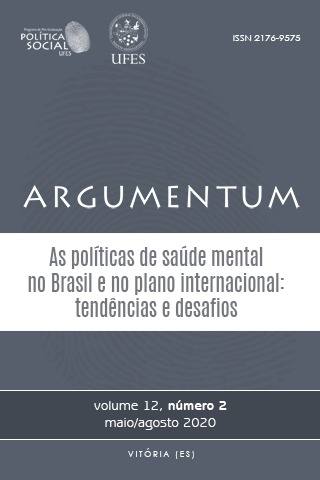A contribution to the critique of the political economy of Brazilian psychiatric counter-reforms
DOI:
https://doi.org/10.18315/argumentum.v12i2.28943Abstract
This article outlines a critique of the political economy of current Brazilian Psychiatric Counter-reform. It relies on studies on the political economy of Psychiatric Reform, budgetary data, and the implementation of mental healthcare policies from 2001 to 2019. Psychiatric Counter-reform is a process of budgetary downsizing, renewed use of asylums, and commodification, with: the reappearance of psychiatric hospitals in policies, the centrality of Therapeutic Communities in the area of alcohol and other drugs, increases in the funding of such institutions, the reversal of the tendency to close psychiatric beds and reduced investment in extra-hospital actions. This constitutes a break in the continuous development of Psychiatric Reform; an expression of neoliberal dynamics in mental healthcare, which has intensified since 2015, expanding the expropriation and plundering of both the working class and the State by capital.
Downloads
Downloads
Published
How to Cite
Issue
Section
License
Copyright Transfer Agreement
As a condition for submission, the authors must agree with the Copyright Transfer Agreement, by checking the box after reading the clauses.
The author(s) (hereinafter "AUTHOR") hereby agrees to transfer, without any financial compensation, the property of copyrights regarding Argumentum, a journal of the Postgraduate Program in Social Politics (Programa de Pós-graduação em Política Social), Federal University of Espírito Santo (Universidade Federal do Espírito Santo) - Av. Fernando Ferrari, 514 - Goiabeiras 29075-910, Vitória (Brazil), (hereinafter "ARGUMENTUM"), according to the following terms and conditions:
1. I am aware of the terms of "Care Ethics Research Guide" described in the Policies section.
2. AUTHOR warrants to be the writer and copyright holder of the WORK submitted.
3. AUTHOR declares that the WORK does not infringe the rights of third-parties; that the distribution of images (if existent) was authorized; and that AUTHOR assumes total moral and property responsibility for their content.
4. AUTHOR agrees to transfer all the copyrights concerning the WORK to ARGUMENTUM, especially the rights to edit, publish, translate into another language, and reproduce it through any process or technique. ARGUMENTUM becomes the exclusive owner of the rights regarding the WORK, and any total or partial reproduction, in any other medium, printed or electronic, is strictly forbidden without prior written consent by ARGUMENTUM.
5. The copyright transfer is unpaid and, therefore, there will be no monetary compensation whatsoever by ARGUMENTUM in order to use the TEXT.

